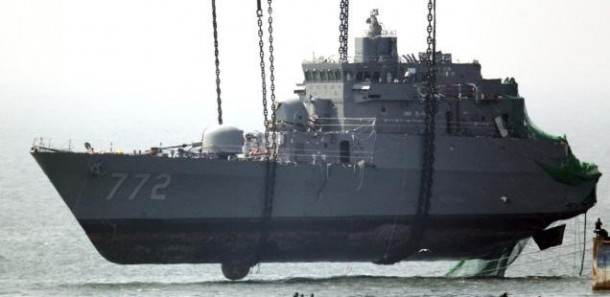Korean Tensions Rise As South Cuts Off Most Ties With Pyongyang
 Things continue to get tense on the Korean Peninsula:
Things continue to get tense on the Korean Peninsula:
BEIJING — Secretary of State Hillary Rodham Clinton expressed full U.S. support Monday for South Korea’s decision to take tough new steps against North Korea and said Pyongyang’s “belligerence” has created a “highly precarious situation” in the region.
Hours earlier, South Korean President Lee Myung-bak announced that his nation would close its sea lanes to North Korea and cease all trade and most investment in the country. Lee also called for a change in the North’s Stalinist regime.
The South Korean president spoke to his nation after an international investigation implicated North Korea in the deadly torpedoing of the South Korean warship Cheonan on March 26. The attack killed 46 South Korean sailors.
“We are working hard to avoid an escalation of belligerence and provocation,” Clinton told reporters on the sidelines of meetings in Beijing. “This is a highly precarious situation that the North Koreans have caused in the region. And it is one that every country that neighbors or is in proximity to North Korea understands must be contained.”
At the United Nations, U.N. Secretary General Ban Ki-moon, who served previously as South Korea’s foreign minister, issued an unusually tough statement saying the evidence of North Korean culpability in the torpedo attack was “overwhelming and deeply troubling.” He added, “I fully share the widespread condemnation of the incident.”
Ban sought to nudge China and other Security Council members to approve a tough response to North Korea’s alleged action.
“I listened carefully to the announcement made by Republic of Korea President Lee last night,” Ban said. “Pursuant to his call for the Security Council to address the matter, close consultations are expected to take place among key members of the council. I am confident that the council, in fulfilling its responsibility for the maintenance of international peace and security, will take measures appropriate to the gravity of the situation.”
Clinton said she was having “intensive consultations” with China about the issue, but it appeared so far that China has yet to decide whether to publicly back the results of the investigation or to support Lee’s call for the U.N. Security Council to take up the issue.
Speaking to reporters, Foreign Ministry spokesman Ma Zhaoxu contended that China’s position was “very clear” on the Cheonan’s sinking and said that both South and North Korea should “exercise restraint and remain cool-headed.”
In addition to halting trade and most investment and shutting its sea lanes to North Korean ships, South Korea will also resume psychological warfare exercises and increase its participation in exercises designed to halt the proliferation of weapons of mass destruction, South Korean officials said.
I’m still at the point where I can’t see all of this being anything other than posturing on both sides. South Korea is not going to take any overt acts without the blessing and backing of the United States, and armed conflict in Korea is the last thing the U.S. wants right now. As for the North, they’re not going to act without the blessing of China and, much like the U.S., war in Korea is clearly not something the Chinese either want or need.
So what happens from here ? Honestly, your guess is as good as mine.
Update: A further thought occurs. The fact that the parties involved (except maybe the DPRK who is ruled by people whose motivations I don’t think anyone can figure out anymore) don’t want a conflict doesn’t mean we won’t blunder into one. History is full of plenty of examples of that happening.

They are probably posturing. However it is difficult to predict aging dictators. Kim Jong-il may think that the U.S. desire not to go to war means they are unwilling or incapable to effectively engage in war. I’m not sure if Obama would be willing to back South Korea with much more than talk.
IMO we are very capable but I’m not sure how much of our large heavy warfare capabilities have been decreased with so much focus on small light warfare. There is only one way to find out but I hope it doesn’t come to that.
How much backing would South Korea need besides just talk, if China stayed (militarily) out of the conflict? I realize that’s a pretty theoretical situation, but it strikes me that if China stays out militarily, the South’s armed forces are much superior to the North’s. The North may have a bigger army, but its in a pretty decrepit state technologically.
Neil,
Even a short war would be devastating for the South if the DPRK unleashed it’s military on the heavily inhabited areas around Seoul, which is a mere hour or so away from the DMZ.
The North’s massive amount of prepositioned artillery dug into tunnels along most of the DMZ can range all of Seoul and beyond. The civilian casualties from their use (and they WILL use them if pushed) is what deters the South from doing anything to precipitate a conflict. In effect the population of Seoul is hostage to the entire situation.
Breaking our word and commitments by standing by and watching our ally be attack is a good idea? Right. If we are not confident that Obama will act than why would Jong-il think otherwise.